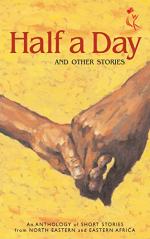|
This section contains 368 words (approx. 1 page at 400 words per page) |

|
The Martyr Summary & Study Guide Description
The Martyr Summary & Study Guide includes comprehensive information and analysis to help you understand the book. This study guide contains the following sections:
This detailed literature summary also contains Bibliography on The Martyr by Ngũgĩ wa Thiong'o.
The short story "The Martyr" by Kenyan novelist Ngugi wa Thiong'o, East Africa's leading writer, was first published in 1974, in his collection Secret Lives and Other Stories. "The Martyr" takes place in colonial Kenya, during a time of rebellion amongst the native Kikuyu people against the white European settlers and plantation owners. News of the murder of two white settlers by their own African "houseboy" initiates the events of the story. Mrs. Hill, a white plantation owner, is visited by her friends Mrs. Hardy and Mrs. Smiles to discuss the murder. Njoroge, an African man who works as the "houseboy" of Mrs. Hill, has plans to kill Mrs. Hill that night, with the help of the Ihii (Freedom Boys). While Mrs. Hill prides herself on her generosity to the Africans who work for her and the loyalty of her "houseboy," Njoroge in fact deeply resents her for her "smug liberalism" and her "paternalism" in these matters. In his small hut that night, Njoroge thinks of his own wives and children, and then of Mrs. Hill's children, who are away at school. Seeing her "humanized" in this light, he is unable to conceive of killing her. He runs to her house to warn her before the Freedom Boys arrive to murder her. Alarmed and suspicious, Mrs. Hill incorrectly believes he is knocking at her door to kill herand she shoots him in what she believes is self-defense. Thus, "she had in fact killed her savior."
"The Martyr" addresses several concerns central to Ngugi's fiction and nonfiction writing. It takes place at a time of social and political upheaval in Kenyan history. The oppressive nature of the European colonial presence in Kenya is portrayed from the perspective of a native Kenyan. The typical colonial attitude in Africathat the African people are "savages" who benefit from the "civilization" of the white colonistsis expressed through the opinions of the white characters in the story. The Christian imagery of the "martyr" draws on Ngugi's Christian upbringing and his later renunciation of Christianity as a tool of colonialism. Finally, Ngugi explores the complexity of African and European relations in the colonial era, thus "humanizing" both sides of the conflict.
Read more from the Study Guide
|
This section contains 368 words (approx. 1 page at 400 words per page) |

|



